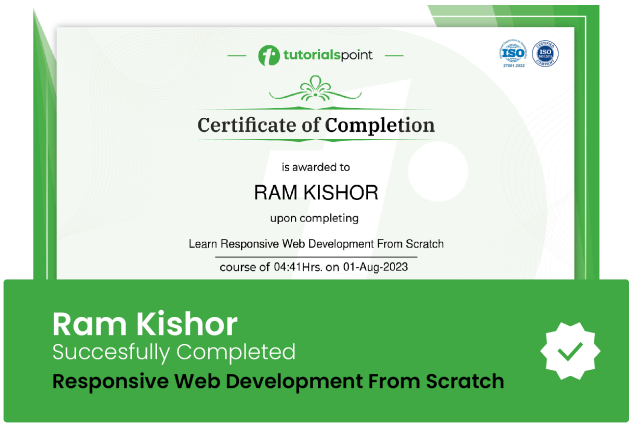Deep Learning in Practice I: Tensorflow Basics and Datasets
Pain-Free Deep Learning Projects and Dataset Design in Tensorflow 2.0

Lectures -82
Resources -2
Duration -4 hours

30-days Money-Back Guarantee
Get your team access to 10000+ top Tutorials Point courses anytime, anywhere.
Course Description
Do you want to start developing deep learning solutions, but you do not want to lose time in mathematics and theory?
Do you want to conduct deep learning projects, but do not like the hassle of tedious programming tasks?
Do you want an automated process for developing deep learning solutions?
This course is then designed for you! Welcome to Deep Learning in Practice, with NO PAIN!
This course is the first course on a series of Deep Learning in Practice Courses of Anis Koubaa.
Deep Learning in Practice I: Tensorflow 2 Basics and Dataset Design (this course): the student will learn the basics of conducting a classification project using deep neural networks, then he learns about how to design a dataset for industrial-level professional deep learning projects.
Deep Learning in Practice II: Transfer Learning and Models Evaluation: the student will learn how to manage complex deep learning projects and develop models using transfer learning using several state-of-the-art CNN algorithms. He will learn how to develop reusable projects and how to compare the results of different deep learning models in an automated manner.
Deep Learning in Practice III: Face Recognition. The student will learn how to build a face recognition app in Tensorflow and Keras.
Deep Learning in Practice I: Basics and Dataset Design
There are plenty of courses and tutorials on deep learning. However, some practical skills are challenging to find in this massive bunch of deep learning resources, and that someone would spend a lot of time to get these practical skills.
This course fills this gap and provides a series of practical lectures with hands-on projects through which I introduce the best practices that deep learning practitioners have to know to conduct deep learning projects.
I have seen several people developing deep learning projects, but they fail to make their projects organized and reusable for other projects. This would lead to losing huge time when switching from one project to the others. In this course, I present several tips to efficiently structure deep learning projects that make you generate results in one simple click, instead of losing time in manual processing data collected from deep learning models.
The hands-on projects explain in detail the whole loop of deep learning projects starting from data collection, to data loading, pre-processing, training, and evaluation.
By the end of the course, you will be able to design deep learning projects in very little time with a comprehensive set of results and visualizations.
Goals
What will you learn in this course:
Develop complex deep learning projects
Efficiently organize and structure deep learning projects
Develop reusable libraries to reduce development time of deep learning projects
Understand how to perform efficient training of classification projects
Evaluate the performance of deep learning models
Load datasets in numpy array in different ways
Conduct training on local machine and Google Colab
Design a dataset from data collection to HDF5 partitioned dataset
Prerequisites
What are the prerequisites for this course?
- Develop complex deep learning projects
- Efficiently organize and structure deep learning projects
- Develop reusable libraries to reduce the development time of deep learning projects
- Understand how to perform efficient training of classification projects
- Evaluate the performance of deep learning models
- Load datasets in NumPy array in different ways
- Conduct training on the local machines and Google Colab
- Design a dataset from data collection to HDF5 partitioned dataset

Curriculum
Check out the detailed breakdown of what’s inside the course
Course Introduction
7 Lectures
-
Interview with students about the course 02:32 02:32
-
What is really new in this course? 02:22 02:22
-
Course Content 01:15 01:15
-
About the instructor 02:13 02:13
-
Pre-requisites
-
What if I do not know neural networks?
-
Do you want an introduction for deep learning/machine learning concepts?
[Beginner Level] Cat/Not Cat Classification Project: Part 1 Data Loading
11 Lectures

[Beginner Level] Cat/Not Cat Classification Project: Part 2 Perform the Training
16 Lectures

[Beginner Level] Cat/Not Cat Classification Project: Part 3 Evaluate the Model
7 Lectures

[Intermediate] The Vehicle Type Classification Problem
6 Lectures

[Intermediate] Create dataset and collect images
4 Lectures

[Intermediate] Dataset pre-processing: renaming and duplicate removal
6 Lectures

[Intermediate] HDF5 dataset creation
15 Lectures

[Intermediate] Creation of train/dev/test dataset
4 Lectures

[Intermediate] Train a CNN model with your HDF5 dataset
5 Lectures

Summary and What's Next?
1 Lectures

Instructor Details

Anis Koubaa
eCourse Certificate
Use your certificate to make a career change or to advance in your current career.

Our students work
with the Best


































Related Video Courses
View MoreAnnual Membership
Become a valued member of Tutorials Point and enjoy unlimited access to our vast library of top-rated Video Courses
Subscribe now
Online Certifications
Master prominent technologies at full length and become a valued certified professional.
Explore Now


 Updated on Apr, 2024
Updated on Apr, 2024
 Language - English
Language - English